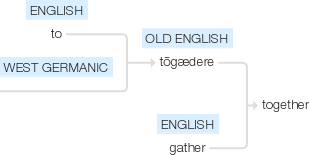Together
Old English tōgædere, based on the preposition to + a West Germanic word related to gather. The adjective dates from the 1960s.
wiktionary
From Late Middle English together, from earlier togedere, togadere, from Old English tōgædere(“together”), from Proto-Germanic *tō(“to”) + *gadar(“together”), from Proto-Indo-European *gʰedʰ-(“to unite, keep”), equivalent to to-2 + gather. Cognate with Scots togiddir, thegither(“together”), Old Frisian togadera(“together”), Middle Dutch tegadere, tegader(“together”), Middle High German gater(“together”). Compare also Old English ætgædere(“together”), Old English ġeador(“together”). More at gather.
etymonline
together (adv.)
Old English togædere "so as to be present in one place, in a group, in an accumulated mass," from to (see to) + gædere "together" (adv.), apparently a variant of the adverb geador "together," from Proto-Germanic *gaduri- "in a body," from PIE *ghedh- "to unite, join, fit" (see good, and compare gather).
In reference to single things, "so as to be unified or integrated," from c. 1300. Adjective meaning "self-assured, free of emotional difficulties" is first recorded 1966. German cognate zusammen has as second element the Old High German verbal cognate of English same (Old English also had tosamne "together").
